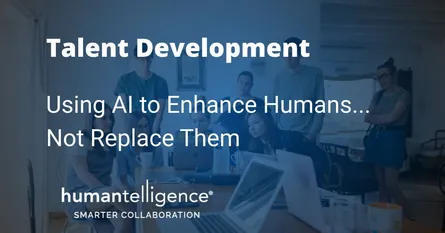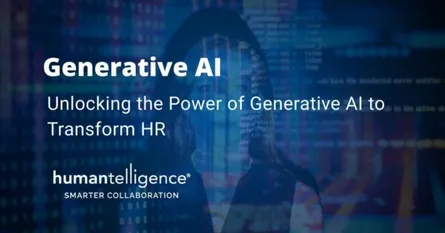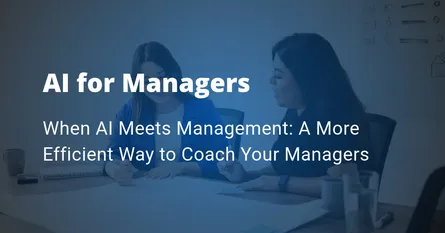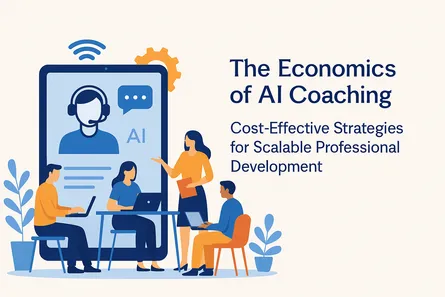
Ai

AI to Enhance Humans...Not Replace Them at Work
- 17 Oct, 2024
- AI
Emotional intelligence at work has become a cornerstone for effective professional interactions in modern society. As workplaces become more complex and diverse, the ability to understand and manage emotions—both one’s own and those of others—has become essential for fostering productive and integrated work environments. The World Economic Forum's "Future of Jobs Survey" highlights that by 2025, emotional intelligence will be one of the top skills required in business, highlighting its growing importance in the professional sphere. Despite its recognized value, developing and applying emotional intelligence at work present numerous challenges. Traditional training methods, which are often costly and difficult to scale, fail to provide the practical, real-time application necessary for true skill acquisition. Of the employees who received traditional training, 43% considered it ineffective. Furthermore, identifying and recruiting talent with high emotional intelligence is a complex process, often relying on subjective measures and lengthy evaluation periods. Enter artificial intelligence (AI). By leveraging AI technologies, organizations can improve emotional intelligence in the workplace and overcome potential hurdles by offering scalable, personalized, and effective solutions. How Can AI Help Individuals Develop Emotional Intelligence? AI technologies can play a pivotal role in overcoming the challenges associated with developing and applying emotional intelligence in the workplace. At Humantelligence, I've seen firsthand how AI-powered assessments can scan entire companies and enhance collaboration. By analyzing communication patterns in meetings and written interactions (both offline and virtual), these tools provide real-time, personalized feedback on how to improve emotional interactions. Employees then receive insights on how to adapt their communication to better suit their audience's preferences and motivations, ensuring more effective and empathetic exchanges. In our own workplace, we use AI tools to rewrite communication at the push of a button, tailoring messages to the emotional preferences of the recipients. This feature enhances day-to-day interactions and fosters a more emotionally intelligent workplace culture. In meetings, our AI engine scans the dynamics and provides the emotional intelligence insights needed to improve productivity and collaboration. This proactive approach integrates emotional intelligence into everyday workflows, rather than letting it be a neglected aspect of professional development. We also address the challenge of scalability in emotional intelligence training. While traditional training methods are often focused on a small percentage of leaders and managers, all employees receive personalized training up to 20 times a month, equating to 240 interactions a year. This consistent use makes the training more impactful and transformational across the organization. During recruitment, we utilize advanced psychometric evaluations and behavioral analysis to assess candidates' emotional competencies. This approach allows us to identify high emotional intelligence candidates early in the hiring process, leading to better team dynamics and performance. 3 Best Practices to Integrate AI with Emotional Intelligence Training for Improved Professional Interactions Integrating AI with emotional intelligence training can significantly enhance professional interactions and workplace dynamics. The following are just a few of the best practices we've learned while integrating AI across our organization and navigating the challenges that arose along the way. 1. Look for Personalized Learning Opportunities Seventy-five percent of Fortune 500 companies use emotional intelligence training, and for good reason. These AI tools can analyze individual learning styles and preferences to deliver tailored training programs that meet the specific needs of each employee. At Humantelligence, we've seen how AI tools can adapt training content with a click of a button to meet the needs of each user. For example, if an employee struggles with a particular aspect of emotional intelligence, AI can provide additional resources and exercises to address that specific area. An effective AI-driven platform should provide personalized insights and training modules that help employees develop their emotional intelligence skills in a way that is most effective for them. This approach ensures that employees are more engaged and can apply what they learn sooner rather than later. 2. Implement Real-Time Feedback Mechanisms Real-time feedback is crucial for the practical application of emotional intelligence skills. AI technologies can provide immediate insights and suggestions based on an employee's interactions and communications. In fact, Gallup data show that when employees receive meaningful feedback within the last week, they’re almost four times more likely to be engaged. To meet this need at Humantelligence, we implemented a tool that offers real-time feedback on email communications and meeting dynamics. These real-time insights are surfaced within an employee’s workflow, which helps them adjust their behavior and improve their emotional intelligence in the moment. This continuous feedback loop is essential for reinforcing learning and promoting ongoing development. 3. Integrate Emotional Intelligence Training into Daily Workflows Emotional intelligence training should be seamlessly integrated into the daily workflows of your employees. In our daily workflows, we use AI tools that can be embedded into existing work processes, such as communication platforms and meeting tools. This integration makes it easier for employees to access and apply their training in real-world scenarios. For those who struggle with soft skills, AI-driven training insights can also be an essential resource for enhanced productivity and job satisfaction. According to research from IDC, organizations stand to benefit up to $1 trillion in productivity gains worldwide over the next two years by implementing skills development powered by generative AI and automation. AI can significantly improve collaboration among teams by providing real-time insights into their communications, helping them work better and faster together. This ensures that emotional intelligence training is not an isolated event but a continuous part of their everyday interactions. As emotional intelligence becomes increasingly important in the workplace, leveraging AI to provide scalable, personalized, and real-time training can address many of the challenges associated with traditional emotional intelligence development methods. By adopting best practices for integrating AI and emotional intelligence, organizations can foster a more emotionally intelligent workforce, leading to better communication, stronger teamwork, and improved overall performance.

Unlocking the Power of Generative AI to Transform HR
In an era marked by digital transformation and remote work, Human Resources (HR) professionals face an evolving landscape. The challenges of recruiting top talent, maintaining effective communication, and optimizing productivity have never been more critical for the employee experience. Fortunately, generative Artificial Intelligence (AI) is emerging as a transformative force in HR, offering innovative solutions to address these issues. In this article, we'll explore the power of generative AI to transform HR by reshaping practices, improving recruitment processes, enhancing communication, and boosting productivity in distributed workforces. Revolutionizing Recruitment with Generative AI Recruitment has always been a cornerstone of HR, but the process can be time-consuming and fraught with biases. Generative AI, through its natural language processing and machine learning capabilities, is revolutionizing how organizations identify and attract top talent. Here are some key ways in which generative AI is reshaping recruitment: 1. Automated Candidate Screening Generative AI-powered tools can analyze thousands of resumes and job applications within seconds, ensuring that every candidate is evaluated fairly. These systems can identify relevant qualifications, skills, and experience, streamlining the initial screening process. According to a survey conducted by HR Dive, 72% of HR professionals reported that AI has improved their ability to find the right candidates more efficiently. 2. Eliminating Bias in Hiring One of the most significant challenges in HR is reducing unconscious bias during hiring. Generative AI algorithms are designed to make decisions based solely on data, reducing the risk of discrimination based on gender, race, or other factors. It promotes diversity and inclusivity in the workplace. 3. Personalized Candidate Experiences Generative AI can personalize candidate interactions, making potential employees feel valued from the beginning. Chatbots and AI-driven email responses can answer candidate queries promptly, enhancing the overall candidate experience. You can even make these responses sound more human than the traditional chatbot. Juan Betancourt, CEO of Humantelligence and well-known executive search recruiter notes, "Generative AI is a game changer for HR. The power of generative AI to transform HR will show itself in saved time and also an improvement in the quality of candidates screened. It will make the recruitment process is more efficient and inclusive than ever before." Generative AI to Transform HR in the Delivery of Communication Across Distributed Teams Effective communication is the glue that holds remote teams together. Generative AI is playing a pivotal role in bridging communication gaps and fostering collaboration. Here's how: 1. Virtual Assistants for HR Queries Generative AI-powered virtual assistants can handle routine HR inquiries from employees, such as leave requests, policy clarifications, and benefits queries. This not only frees up HR professionals from administrative tasks but also ensures quick and consistent responses. According to a study by Deloitte, companies that use virtual HR assistants have seen a 50% reduction in HR query resolution time. 2. Multilingual Support In a global workforce, language barriers might hinder effective communication and create inefficiencies. Generative AI can provide real-time translation services, allowing team members from different regions to collaborate seamlessly. 3. AI-Powered Chat and Collaboration Tools AI-driven chat and collaboration tools can analyze conversations and suggest relevant documents, resources, or experts, facilitating information exchange among team members. This enhances productivity and ensures that the right information is always at hand. This also works for email communication and communication in virtual meetings among colleagues. For example, HR can provide employees with an AI plug in to their email provider so that emails can be rewritten and optimized for how the recipient likes to receive information. One simply writes an email and then pushes a button. The email gets rewritten instantly using AI and then tells you why that person prefers this type of communication. "It's important for the employee experience to create a more supportive and engaging environment for people to develop and thrive. AI-driven insights that help people work together better have the power to reduce turnover and boost team productivity, while keeping team cultures/dynamics positioned for the future. It’s an investment that keeps paying dividends across the employee lifecycle,” said Betancourt. In fact, a McKinsey report found that organizations that effectively leverage AI for internal communications and collaboration are 2.5 times more likely to be top performers. Boosting Productivity Through AI-Powered Insights Improving productivity is a constant goal for HR professionals. Generative AI is providing new insights and tools to help organizations streamline processes and maximize efficiency. 1. Predictive Analytics for Workforce Management Generative AI can analyze historical data and predict future workforce needs. This enables HR to plan for staffing levels, skill gaps, and training requirements, ensuring that the organization remains agile in responding to changing demands. IBM's Watson is a prime example of an AI system that offers predictive analytics for HR. 2. Automating Routine HR Tasks Administrative tasks, such as payroll processing and benefits enrollment, can be automated using generative AI. This not only reduces the risk of errors but also frees HR professionals to focus on strategic initiatives. 3. Employee Feedback and Sentiment Analysis Generative AI can analyze employee feedback, surveys, and sentiment data to gauge employee satisfaction and identify potential issues. This proactive approach enables HR to address concerns before they escalate. HR can now focus on strategic initiatives while the AI takes care of routine tasks. Employees also appreciate the quick and accurate responses they receive. Challenges and Ethical Considerations Using Generative AI to Transform HR While generative AI offers numerous benefits, it's essential to acknowledge and address potential challenges and ethical concerns. These include data privacy, algorithmic bias, and the need for ongoing human oversight. HR professionals must ensure that AI is used responsibly and in line with legal and ethical standards. As technology continues to advance, HR departments that embrace generative AI will be better equipped to meet the demands of the modern workforce and drive their organizations toward success in an increasingly digital and remote world. For now, this is just the tip of the iceberg when it comes to the power of generative AI to transform HR. If leveraged right, it can enable organizations to recruit top talent, enhance communication, and boost productivity among distributed workforces. By automating tasks, reducing bias, and providing valuable insights, AI is transforming HR practices and helping companies thrive in a digital and remote world. However, it's crucial to address ethical considerations and ensure responsible AI use to maximize its benefits. As technology continues to evolve, HR professionals who embrace generative AI will be at the forefront of shaping the future of work. If you're interested in learning how Humantelligence's AI-powered psychometric tool can improve the employee experience, let's talk!

Using AI in the Workplace to Make Work Feel More Human
- 07 Feb, 2025
- AI
The fusion of artificial intelligence (AI) within the fabric of our workplace's daily operations is reshaping not only how we work but how we connect with each other. While technology might seem like a cold mechanism, AI holds the potential to enhance the human touch in the workplace, creating more dynamic, engaging, and personalized experiences for employees. By integrating AI, the complex layers of human interactions and emotional intelligence can be amplified, offering a more human-centric approach to work -- AI that makes work more human. Overview of AI in the Workplace In the digital age, AI serves as a pivotal tool in transforming how organizations operate, particularly in recruitment, communication, and productivity enhancement. Whether it's automating mundane tasks, analyzing employee feedback, or facilitating cross-functional collaboration, AI efficiently addresses some of the workforce's most pressing needs. By utilizing AI's predictive capabilities and real-time analytics, companies can optimize workflows, ensuring that employees are both content and productive in a seamlessly integrated digital environment. The Importance of the Human Touch Human interaction in the workplace is crucial, as it fosters a sense of connection, empathy, and shared purpose. The nuances of human emotions and interpersonal relationships play a significant role in team dynamics and individual performance. AI should not be seen as a replacement for this essential human element. Instead, it can serve as a bridge, enabling deeper insights into team dynamics and facilitating environments where trust, empathy, and effective communication flourish. Ultimately, AI can help nurture a more emotionally intelligent workforce by providing personalized recommendations and insights that enhance the way we understand and respond to each other. AI's Role in Learning and Development Adapting to New Skills and Training Methods The workplace is experiencing a seismic shift with the growing reliance on remote and hybrid work models. This has accelerated the need for new learning and development (L&D) strategies. Traditional training methods, such as one-time workshops or external consultants, no longer meet the dynamic needs of today's workforce. Companies are transitioning to digital platforms that can provide on-demand, flexible learning experiences, which better support the way employees learn today. These platforms allow for the integration of reskilling and upskilling into daily workflows, fostering continuous professional growth. Personalized Learning via AI Personalized learning has emerged as a key component of effective L&D programs. AI-driven platforms can tailor educational content to individual career aspirations and learning styles, empowering employees to take ownership of their development journey. These platforms can provide adaptive learning paths, helping individuals focus on specific skills they need to advance in their roles. This approach not only enhances engagement but also aligns with today’s workforce that desires personal and professional growth opportunities. The Impact on Employee Retention A well-crafted L&D program significantly impacts employee retention. Research shows that employees are far more likely to stay with a company if they see clear paths for advancement and skill development. Companies that offer comprehensive training have witnessed higher income per employee and greater overall performance. Therefore, investing in personalized, AI-enhanced learning solutions can be a strategic advantage in retaining top talent and reducing turnover costs. Enhancing Communication and Collaboration with AI Bridging Gaps in Remote and Hybrid Work Setups The advent of remote work has posed challenges for maintaining effective communication and collaboration within teams. AI has the potential to bridge these gaps by facilitating seamless communication across different locations and times. AI-driven tools can manage virtual team interactions, ensuring that communication remains consistent and effective. They provide insights into team dynamics, enabling smoother transitions and interactions among distributed team members. Utilizing AI to Improve Emotional Intelligence AI technology can assist in enhancing emotional intelligence within teams by analyzing communication patterns and providing feedback. These insights help employees tailor their interactions to better suit their colleagues’ emotional and motivational preferences, fostering understanding and empathy. This capability is particularly beneficial in remote settings, where misunderstandings can easily occur due to the lack of non-verbal cues. Tools for Real-Time Communication Insights Modern AI-powered tools can deliver real-time insights during meetings and collaborative sessions. These tools analyze discussions, suggest relevant documents, and provide conversational prompts, thus improving the quality and outcome of communications. Additionally, AI can offer real-time translation services in global teams, ensuring language barriers do not impede collaboration. By integrating these tools into daily workflows, organizations enhance productivity and enable more meaningful interactions among team members. By leveraging AI in these areas, organizations can create a more human-centered work environment, fostering growth, better communication, and deeper connections among employees. This not only improves individual performance but also propels companies towards achieving higher overall objectives. Creating a Feedback-Driven Culture Fostering an environment where employees feel heard and valued has become more pertinent than ever. Modern workplaces demand an adaptive feedback culture that progresses beyond traditional annual performance reviews. AI’s Role in Continuous Feedback Mechanisms Artificial intelligence introduces a transformative approach to feedback in the workplace. By leveraging AI-driven platforms, organizations can seamlessly integrate feedback into daily workflows. AI tools can facilitate continuous feedback loops through employee engagement suites that incorporate psychometrics to enhance understanding. These platforms can provide insights into employees' work behaviors, motivators, and energizers, allowing managers to tailor feedback more effectively. Automated feedback reminders and real-time coaching tips can also encourage a culture of continuous improvement. This not only aids in addressing issues promptly but also in reinforcing positive behaviors, ultimately leading to enhanced employee satisfaction and retention. Building a Supportive and Inclusive Workplace AI also plays a crucial role in nurturing a supportive work environment by providing data-driven insights into team dynamics. AI tools can identify trends and patterns in employee behavior and sentiment, offering insights into workplace inclusivity and team cohesion. These insights empower HR professionals to make informed decisions on diversity and inclusion initiatives, ensuring that every team member feels valued and included. By promoting open communication and understanding, AI can help to dismantle existing barriers, fostering a more cohesive and inclusive work environment. Benefits of AI in Team Dynamics Harnessing AI’s potential in team settings can vastly improve how teams interact, collaborate, and perform in the workplace. Improving Team Collaboration with AI Insights Artificial intelligence can significantly enhance collaboration by analyzing communication patterns and providing insights into areas of improvement. AI tools assist teams by highlighting collaboration bottlenecks and facilitating more effective communication strategies. For instance, AI can recommend optimal communication practices tailored to individual team members based on their preferred communication styles. By understanding these nuances, teams can reduce miscommunication and enhance collective problem-solving capabilities. Enhancing Team Performance Metrics AI offers dynamic analytics capabilities that track and predict team performance metrics. These tools enable managers to pinpoint specific areas that require development and provide real-time feedback to align efforts with organizational goals. By utilizing predictive analytics, AI can forecast potential team challenges and suggest proactive measures, thus maintaining consistent team performance. Furthermore, AI's ability to personalize learning paths ensures that team members acquire the skills necessary to overcome challenges and contribute more meaningfully to team objectives. Overall, the integration of AI in the workplace is not about replacing human interaction but enhancing it. By promoting continuous feedback, supporting inclusive environments, and optimizing team dynamics, AI enriches the human touch at work, creating a more connected and humanized workforce. Final Thoughts Embracing AI tools in the workplace represents more than just technological advancement; it signifies a bridge to a more human-centric work environment. By enhancing emotional intelligence and offering personalized learning experiences, AI contributes significantly to fostering a culture of inclusion and connection. It's crucial for organizations to leverage AI not only as a tool for efficiency but as a means to enhance the human touch and impart genuine connection in daily interactions. This dual focus ensures that as we scale operations, we also nurture the vital human elements that drive engagement and productivity, ultimately creating workplaces where people feel valued, understood, and integral to their team's success.

When AI Meets Management: A More Efficient Way to Coach Your Managers
- 20 Mar, 2025
- AI
With organizations streamlining operations and reducing managerial layers, the demand for effective manager development solutions has never been more critical. What’s more, a December 2022 Gartner survey of more than 6,000 individual contributors and managers revealed that managers are twice as likely to report an increase in responsibilities versus individual contributors, compared to before the pandemic. For example, 35% of managers say they have more direct reports and 49% report that the complexity of their responsibilities has increased. Enter generative AI for managers, a transformative technology poised to revolutionize how we develop and support managers. By leveraging AI, organizations can provide personalized, real-time guidance tailored to specific workplace challenges, enhancing managerial effectiveness and driving organizational success. While many managers are turning to generic AI chatbots for quick answers, these tools lack the specialized capabilities needed for effective coaching and development. The real potential lies in artificial intelligence that's specifically engineered for management challenges. This technology is built with company context, backed by the latest academic research on workplace behavior and effectiveness, and designed to provide secure, personalized guidance that aligns with your organization's needs. Why Advanced Manager Development is Crucial Effective leadership directly impacts employee engagement, productivity, and overall business success. Recent trends show companies are reducing managerial positions, with some cutting up to 10% of their manager headcount, driven by cost-cutting and efficiency efforts, as seen in examples like Google's cuts. This downsizing often results in increased responsibilities for the remaining managers, necessitating robust support systems to ensure they can lead effectively. Far too often, as organizations streamline operations and managers are required to take on increasingly complex roles, they aren’t met with the right tools and support to navigate those challenges, make informed decisions, or lead their teams with confidence. Without proper development, managers may struggle with communication, conflict resolution, and strategic thinking—leading to disengaged employees, high turnover, and inefficiencies. Still, traditional development approaches, such as workshops and seminars, often fall short due to their generic nature, lack of immediacy, and high costs. Managers require coaching solutions that are not only personalized but also readily accessible within their day-to-day workflows—providing personalized guidance that can help them refine their leadership style, strengthen team dynamics, and drive better outcomes. The Limitations of Generic AI Solutions Generic AI solutions may provide surface-level information but fail to account for the unique contexts, challenges, and working styles managers encounter within their specific organizations. This gap underscores the need for AI systems specifically engineered for management challenges, integrating company context and aligning with organizational goals. Personalization: Moving Beyond One-Size-Fits-All Effective AI for managers must transcend generic advice by incorporating data about individual managers' capabilities, personality traits, and team dynamics. By understanding these nuances, AI can offer truly personalized guidance that addresses managers' most pressing challenges. For instance, integrating insights about individual team members and their tendencies allows AI to provide advice tailored to the manager's unique situation and leadership style. This level of personalization ensures that the guidance is relevant and immediately applicable. Just-In-Time Support: Integrating into the Managerial Workflow Unlike traditional development approaches that require scheduling time away from work, AI can provide instant, relevant, always-on support either at the moment managers face challenges – or better yet, before that challenge becomes a full-fledged problem. This just-in-time assistance aligns with research indicating that managers often have too much to do and not enough time to get it done. A McKinsey survey found that nearly half of respondents devote less than a quarter of their time to talent and people management because they simply don’t have time to spend on it, while another 35 percent said they don’t have the resources required, suggesting that their organizations don’t have a structure in place that encourages them to prioritize people. By integrating seamlessly into their workflow, AI for manager development offers guidance precisely when it's needed, throughout the workday, enhancing decision-making and problem-solving efficiency. Bridging Theory and Practice: Actionable Insights The most effective AI solutions bridge the gap between management theory and practical application. By combining the latest management science research and frameworks with specific workplace contexts, AI can provide actionable solutions to immediate challenges. This means managers receive relevant, implementable advice for real situations—not just generic, theoretical frameworks they need to translate into action. Such practical guidance empowers managers to apply best practices directly to their unique scenarios, enhancing their effectiveness. Incorporating Team Context: Tailored Recommendations Incorporating the overall context or dynamic of a team into development can have a significant impact on manager performance, providing a real-world foundation for recommendations. Purpose-built AI should take team dynamics or culture into account as part of its guidance. This ensures all coaching is immediately applicable within the specific environment. By tailoring recommendations to the team's context, AI enhances the relevance and effectiveness of the guidance provided. Staying Current: Integrating Expert Research Well-designed AI for managers should incorporate the latest organizational psychology research and evidence-based management practices. This means synthesizing insights from industrial-organizational psychologists and leadership experts to ensure advice reflects current best practices. By staying abreast of emerging challenges, such as supporting employee mental health and managing hybrid teams, AI ensures that managers are equipped with up-to-date strategies to navigate the ever-changing workplace. Ensuring Security: Protecting Organizational Data Any AI solution for manager development must prioritize corporate security. This entails implementing robust encryption, access controls, and data handling protocols. Unlike public AI tools that risk exposing sensitive information, purpose-built solutions should keep organizational data secure and private. By safeguarding data, organizations can confidently leverage AI for manager development without compromising confidentiality or integrity. Scalability: Consistent Support Across the Organization One of AI's greatest strengths is its ability to provide consistent, high-quality support across the entire organization. When built with the right foundations, AI can deliver personalized, contextual guidance to every team manager while maintaining alignment with company goals and values. This scalability becomes crucial when you consider the ripple benefits of manager effectiveness. Employees under effective managers are 15.4 times more likely to be high performers and 3.2 times more likely to stay with your organization. By offering uniform support, AI ensures that all managers have the tools they need to succeed, leading to enhanced employee retention and performance as well as overall organizational effectiveness. Final Thoughts: The Future of Manager Development Lies in AI The modern workplace demands more from managers than ever before, and traditional development methods are struggling to keep pace. Organizations that embrace purpose-built AI solutions for manager development will not only equip their leaders with the tools they need but will also cultivate a culture of agility, adaptability, and high performance. AI is not just an enhancement—it's a fundamental shift in how we support, develop, and empower managers at scale. Companies that integrate AI-driven manager development today will gain a competitive edge in leadership effectiveness, employee engagement, and overall business success. The future of leadership development is here—are you ready to harness its potential? For more best practices, check out our article, 4 Ways to Effectively Manage Different Work Styles.

The Economics of AI Coaching: Cost-Effective Strategies for Scalable Professional Development
- 10 Apr, 2025
- AI
What was once buzzword is now a mandate. AI is setting the bar for employees, as evidenced in the Shopify memo telling employees that they’ll have to show jobs can’t be done by artificial intelligence before asking for more headcount and resources. What's more, organizations are also under increasing pressure to deliver personalized professional development for employees. Traditional coaching, while effective, often comes with significant financial and logistical challenges. Enter AI-powered coaching: a transformative solution that not only democratizes access to high-quality development but also offers measurable cost savings and scalability. As budgets tighten and the demand for upskilling grows, AI coaching is emerging as a key player in the economics of employee development. Let’s explore how businesses can leverage AI coaching to drive growth, reduce costs, and support talent at scale.Why Traditional Coaching Models Fall Short Executive coaching and one-on-one mentoring have long been staples of professional development, particularly for high-potential employees and senior leaders. While impactful, these programs are also:Expensive: Coaching engagements can cost between $200 and $500 per hour, with executive coaching programs often running into tens of thousands of dollars per participant annually. Inaccessible: Only a small percentage of employees—typically top-tier performers or executives—benefit from traditional coaching due to limited availability and budget constraints. Unscalable: The logistics of providing personalized coaching to large or distributed teams are cumbersome and often unfeasible.This model may work for small cohorts, but it doesn’t align with the needs of modern organizations striving for equitable and continuous learning at all levels.The Rise of AI-Powered Coaching AI coaching bridges the gap between quality and scale by delivering timely, personalized feedback and development tools directly to employees—no scheduling required. Leveraging natural language processing, machine learning, and behavioral science (psychometrics), AI coaches can provide:Real-time feedback Personalized learning paths Data-driven insights into individual and team behaviors Nudges to reinforce soft skills and leadership growthAccording to a 2023 McKinsey report on AI in the workplace, companies adopting AI-enabled tools for talent development are 2.3 times more likely to report productivity gains and cost savings source.The Financial Case for AI Coaching 1. Lower Cost per Employee One of the most compelling benefits of AI coaching is its affordability. Unlike human coaching, where costs increase linearly with each new participant, AI platforms typically operate on a subscription or per-seat basis—dramatically lowering the cost per user. For example, a company might spend $10,000 annually to coach a single executive with a human coach. That same budget could support AI coaching for hundreds of employees, delivering personalized development at a fraction of the cost. 2. Scalable Across Teams and Geographies AI tools are inherently scalable. Whether you’re onboarding 50 new hires or rolling out a leadership development program across five continents, AI coaching platforms can deliver consistent and personalized support without logistical complexity. This scalability is especially crucial for organizations embracing hybrid and remote work, where real-time, self-guided development tools are essential to maintaining engagement and performance. 3. Continuous and On-Demand Support Traditional coaching is episodic—often tied to monthly or quarterly sessions. AI coaching is always on. It provides nudges, feedback, and insights exactly when employees need them, leading to faster behavior change and better retention of skills. Research from BetterUp found that consistent, in-the-moment coaching increased employee engagement by 22% and reduced attrition by 30% source. 4. Actionable Data and ROI Insights AI platforms generate rich, anonymized data that helps organizations understand behavior trends, skills gaps, and coaching effectiveness. This allows L&D leaders to tie coaching outcomes to business metrics like performance, retention, and engagement—something that’s notoriously difficult with traditional coaching. With platforms like Humantelligence, organizations can benchmark team dynamics, measure progress over time, and adapt learning strategies based on real-time analytics.Making AI Coaching Work for Your Organization Here are key considerations if you're looking to maximize the ROI of AI coaching: 1. Align with Business Objectives Start by identifying the specific outcomes you want to drive—such as improving manager effectiveness, boosting cross-functional collaboration, or accelerating leadership readiness. The more aligned your AI coaching solution is with business goals, the clearer the value proposition. 2. Integrate with Existing Tools and Workflows Adoption increases when AI coaching is integrated seamlessly into daily routines. Look for platforms that work within your existing tech stack—such as Slack, Microsoft Teams, or your LMS—so employees can receive insights in the flow of work. 3. Prioritize Personalization A one-size-fits-all approach won’t move the needle. Choose solutions that tailor insights and nudges based on individual personality, communication style, and role. The more relevant the feedback, the higher the engagement. 4. Ensure Data Ethics and Transparency AI tools should be transparent about how they collect and use data. Employees must trust that the coaching they receive is private, secure, and beneficial. Look for vendors with clear data governance policies and a strong track record of responsible AI use.The Future Is Scalable, Equitable Coaching As workforce expectations evolve and the pressure to retain talent intensifies, scalable coaching is no longer optional—it’s essential. AI-powered coaching solutions deliver on the promise of cost-effective, high-impact development that reaches every corner of your organization. At Humantelligence, we believe in empowering every employee with the insights they need to grow. Our AI-powered behavioral science platform helps companies build more agile, self-aware, and collaborative teams—while keeping professional development affordable and measurable.Key TakeawaysTraditional coaching might be effective but it's hard to measure, expensive, and limited in scale. AI coaching reduces the cost per employee while delivering personalized, real-time support. Scalable, data-driven, and integrated into daily workflows, AI coaching can align directly with business goals. Organizations embracing AI coaching see improved engagement, performance, and ROI.Interested in transforming your workplace with scalable, AI-powered coaching? Learn more about our AI coach and discover how to make coaching and employee development more impactful — and accessible — than ever before.